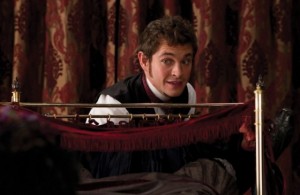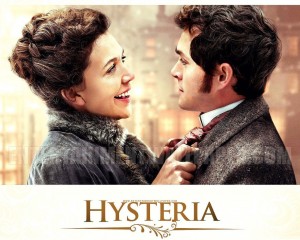HYSTERIA: 2 ½ STARS
 “Hysteria” could easily have been called “Desperate Housewives (of 1880).” Set in 19th century London, the story centers around Mortimer Granville (Hugh Dancy) — a young handsome doctor whose carpal tunnel syndrome led directly to the invention of the vibrator.
“Hysteria” could easily have been called “Desperate Housewives (of 1880).” Set in 19th century London, the story centers around Mortimer Granville (Hugh Dancy) — a young handsome doctor whose carpal tunnel syndrome led directly to the invention of the vibrator.
The year is 1880 and hysteria is “the plague of our times,” according to Dr. Robert Dalrymple (Jonathan Pryce), a doctor whose magic fingers bring relief to London’s upper class ladies. His solution to their dilemma is simple. He offers manual stimulation until his patients achieve “paroxysm.”
In those days hysteria was a catchall phrase used to encompass all manner of female ailments. According to Wikipedia, “women considered to be suffering from it exhibited a wide array of symptoms including faintness, nervousness, sexual desire, insomnia, fluid retention, heaviness in abdomen, muscle spasm, shortness of breath, irritability, loss of appetite for food or sex, and ‘a tendency to cause trouble.'”
Enter Granville, an idealistic doctor who keeps losing jobs at old-fashioned hospitals because of his new-fangled ideas about germs. He accepts an apprenticeship with Dalrymple and soon his nimble fingers and good looks have attracted the attention London’s desperate housewives and daughter Emily Dalrymple (Felicity Jones). She’s an English Rose who stands in contrast to her sister Charlotte (Maggie Gyllenhaal), a live wire suffragette who is passionate about working with the city’s disadvantaged.
Business booms at the doctor’s office until Granville suffers hand and wrist ailments from vigorous overuse. In short order he co-invents the world’s first vibrator with the help of his friend Lord Edmund St. John-Smythe (Rupert Everett). He also discovers true love and the true nature of hysteria.
Despite its racy premise “Hysteria” is rather tame. As social commentary it’s lightweight, shedding little light on the repressive Victorian attitude toward women and sexuality. Sure, the female patients know exactly what the cause of their so-called hysteria is and Gyllenhaal speechifies on women’s rights, but a movie about the invention of the tool that revolutionized sexuality should focus on that and not the predictable rom-com love triangle.
As a comedy it misses the opportunity for big laughs by under-using Everett, whose hammy performance breaks through the stodgy Englishness repressiveness of the setting. The slapstick and masturbation hat make up much of the movie and wears out their welcome early on.
Still, there is something inoffensive about the movie. It’s a sweet attempt to tell an unusual story, but feels like a missed opportunity — which is why “Hysteria” didn’t work for me as well as it might have. I expected more than a comedy of manners with an off-colour edge from the story. This is a rental, not a night out.

